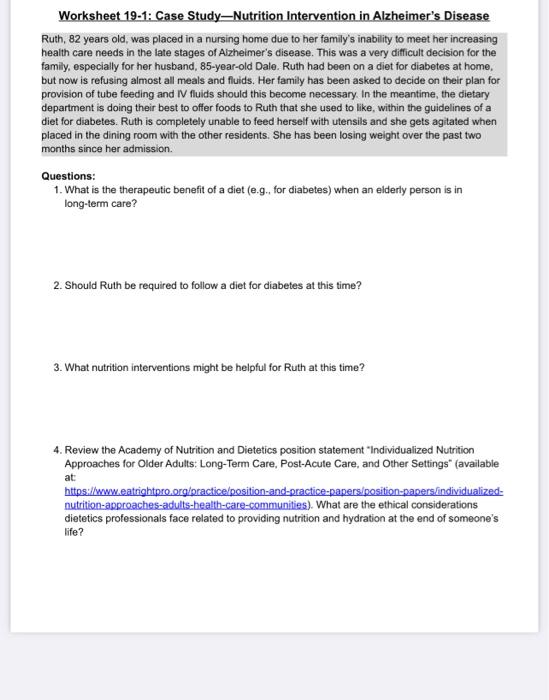Answered step by step
Verified Expert Solution
Question
1 Approved Answer
In your own words Worksheet 19-1: Case Study Nutrition Intervention in Alzheimer's Disease Ruth, 82 years old, was placed in a nursing home due to
In your own words 
Worksheet 19-1: Case Study Nutrition Intervention in Alzheimer's Disease Ruth, 82 years old, was placed in a nursing home due to her family's inability to meet her increasing health care needs in the late stages of Alzheimer's disease. This was a very difficult decision for the family, especially for her husband, 85-year-old Dale. Ruth had been on a diet for diabetes at home, but now is refusing almost all meals and fluids. Her family has been asked to decide on their plan for provision of tube feeding and IV fluids should this become necessary. In the meantime, the dietary department is doing their best to offer foods to Ruth that she used to like, within the guidelines of a diet for diabetes. Ruth is completely unable to feed herself with utensils and she gets agitated when placed in the dining room with the other residents. She has been losing weight over the past two months since her admission Questions: 1. What is the therapeutic benefit of a diet (e.g., for diabetes) when an elderly person is in long-term care? 2. Should Ruth be required to follow a diet for diabetes at this time? 3. What nutrition interventions might be helpful for Ruth at this time? 4. Review the Academy of Nutrition and Dietetics position statement Individualized Nutrition Approaches for Older Adults: Long-Term Care, Post-Acute Care, and Other Settings" (available at: https://www.eatrightpro.org/practice/position-and-practice-papers/position papers individualized- nutrition approaches-adults-health-care-communities). What are the ethical considerations dietetics professionals face related to providing nutrition and hydration at the end of someone's life? Worksheet 19-1: Case Study Nutrition Intervention in Alzheimer's Disease Ruth, 82 years old, was placed in a nursing home due to her family's inability to meet her increasing health care needs in the late stages of Alzheimer's disease. This was a very difficult decision for the family, especially for her husband, 85-year-old Dale. Ruth had been on a diet for diabetes at home, but now is refusing almost all meals and fluids. Her family has been asked to decide on their plan for provision of tube feeding and IV fluids should this become necessary. In the meantime, the dietary department is doing their best to offer foods to Ruth that she used to like, within the guidelines of a diet for diabetes. Ruth is completely unable to feed herself with utensils and she gets agitated when placed in the dining room with the other residents. She has been losing weight over the past two months since her admission Questions: 1. What is the therapeutic benefit of a diet (e.g., for diabetes) when an elderly person is in long-term care? 2. Should Ruth be required to follow a diet for diabetes at this time? 3. What nutrition interventions might be helpful for Ruth at this time? 4. Review the Academy of Nutrition and Dietetics position statement Individualized Nutrition Approaches for Older Adults: Long-Term Care, Post-Acute Care, and Other Settings" (available at: https://www.eatrightpro.org/practice/position-and-practice-papers/position papers individualized- nutrition approaches-adults-health-care-communities). What are the ethical considerations dietetics professionals face related to providing nutrition and hydration at the end of someone's life 
Step by Step Solution
There are 3 Steps involved in it
Step: 1

Get Instant Access to Expert-Tailored Solutions
See step-by-step solutions with expert insights and AI powered tools for academic success
Step: 2

Step: 3

Ace Your Homework with AI
Get the answers you need in no time with our AI-driven, step-by-step assistance
Get Started


